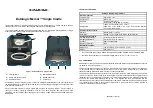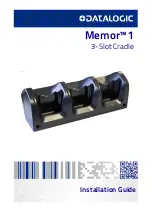
72
If the Weather Clock is moved to another location significantly higher or lower than its initial
standing point (for example from the ground floor to the upper floors of a house), remove the
batteries and re-insert them after about 30 seconds. By doing this, the Weather Clock will
not mistake the new location as being a possible change in air-pressure when really it is due
to the slight change of altitude. Again, disregard weather forecasts for the next 12 to 24
hours as this will allow time for operation at a constant altitude.
THE WEATHER TENDENCY INDICATOR
Working together with the weather icons are the weather tendency indicators (the upward
and downward arrow located near the Weather man). When the indicator points upwards, it
means that the air-pressure is increasing and the weather is expected to improve, but when
indicator points downwards, the air-pressure is dropping and the weather is expected to
become worse.
Therefore, user may see how the weather has changed and is expected to change. For
example, if the indicator is pointing downwards together with cloudy icons, it means that the
last noticeable change in the weather was when it was sunny (the sunny icon only).
Therefore, the next change in the weather will be the cloudy icons since the indicator is
pointing downwards.
Note:
Once the weather tendency indicator has registered a change in air pressure, it will remain
permanently visualized on the LCD.












































